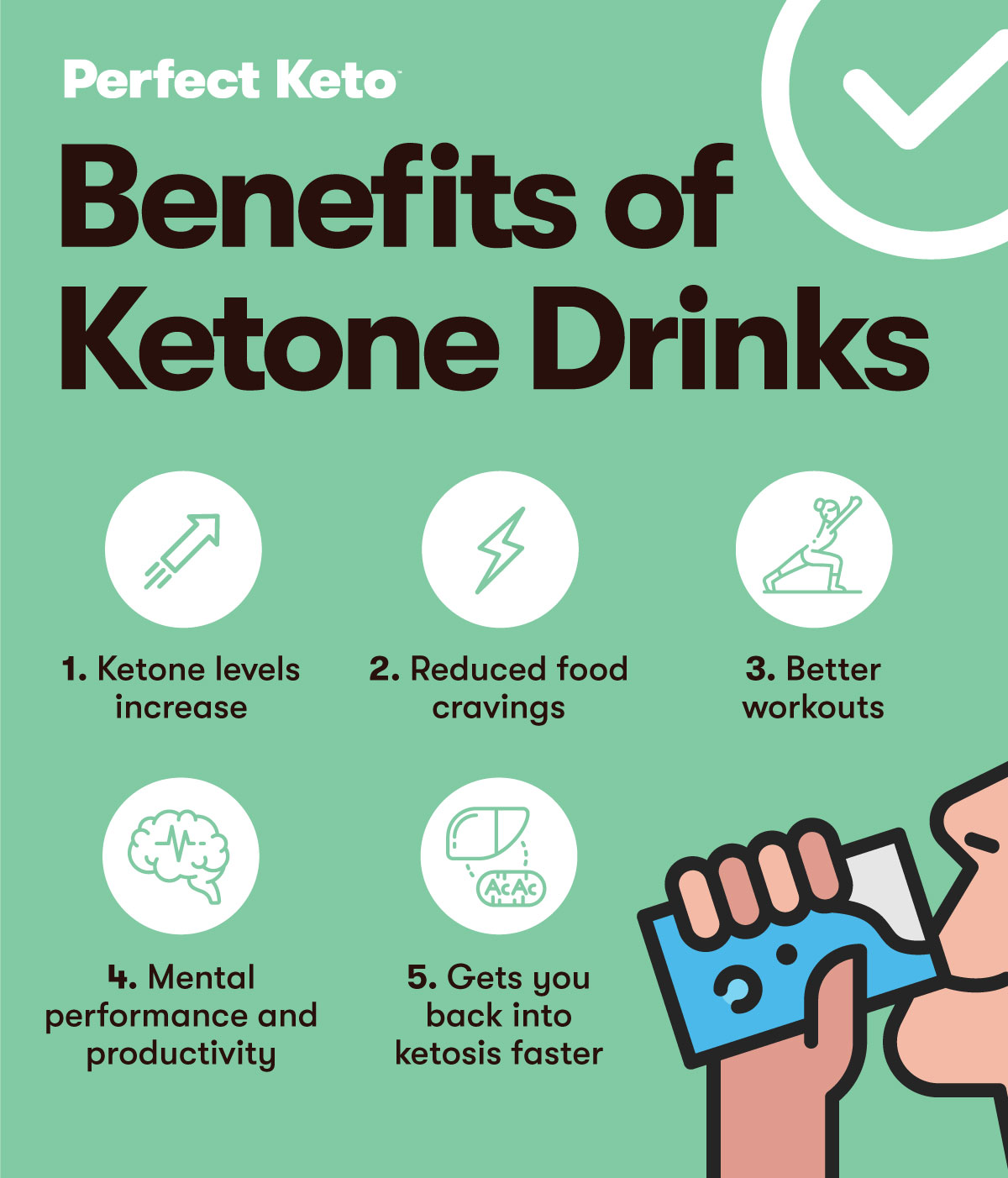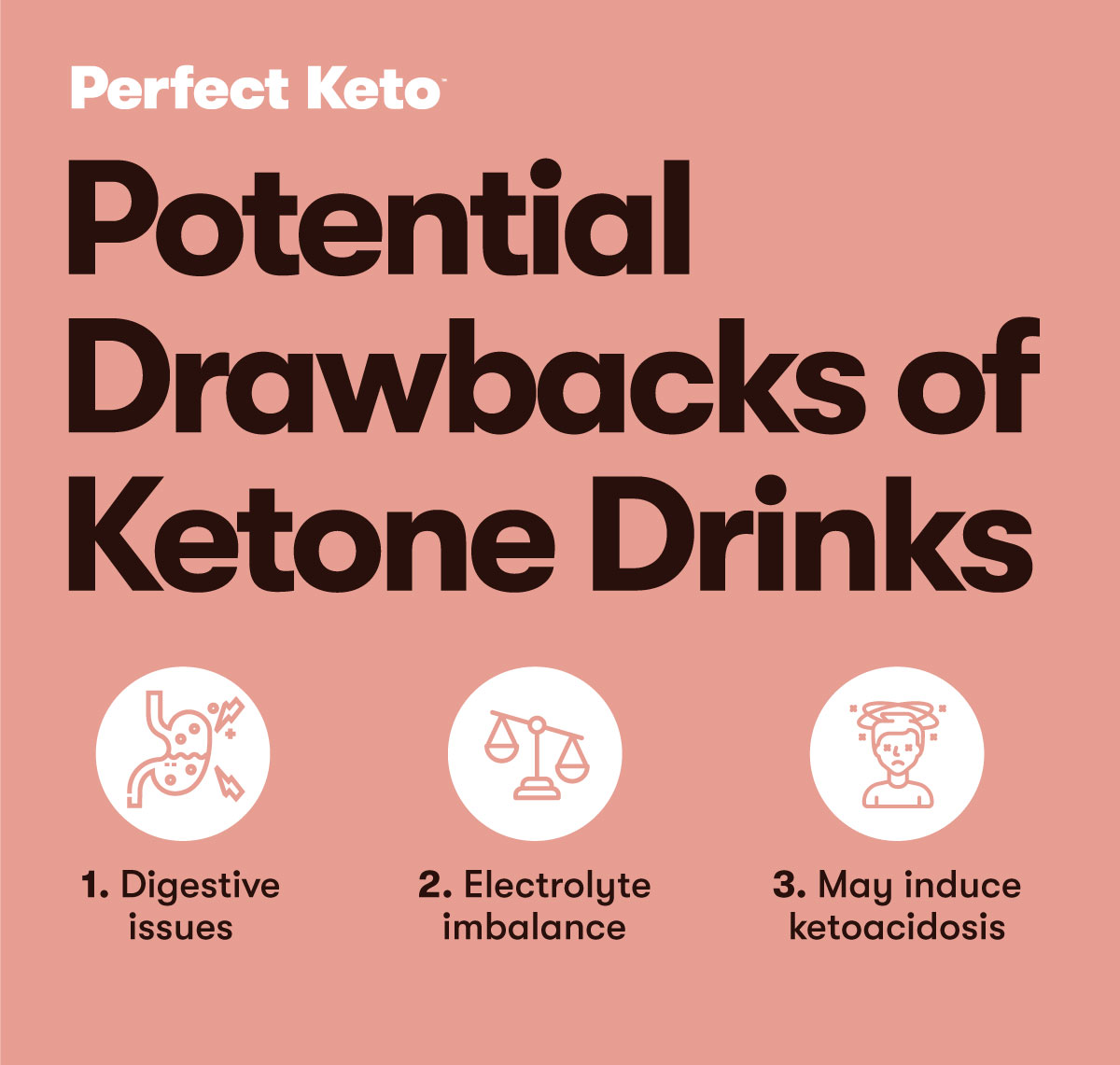Our bodies produce ketones when we restrict carbohydrates — for instance, following a keto diet. We can also take a ketones drink (popularly called exogenous ketones) to support nutritional ketosis and experience its benefits.
Before deciding to supplement, it’s helpful to know the types of ketones that are available, how they help in certain areas of your health and wellness, their safety, and the best ketone supplements on the market.
What are Ketone Drinks?
Ketone drinks or exogenous ketones are a supplement form of ketones that your body naturally creates — in other words, endogenous ketones — by limiting carbs or entering a fasted state.
Your liver produces three types of ketone bodies, namely, acetoacetate (AcAc), beta-hydroxybutyrate (BHB), and acetone (Ace). When you’re in a state of ketosis, you use BHB as your main energy source instead of carbohydrates.
It’s important to note that your body is constantly producing ketones that create 22 adenosine triphosphate (ATP), the energy-carrying molecule, even when you’re eating carbs. However, this increases in ketosis (*).
When it comes to exogenous ketone supplements, you may have noticed BHB as the ketone that’s found in the drink. This is because BHB is the main energy source your body runs on.
Research suggests that 100 grams of BHB produces 10,500 grams of ATP, which is higher than glucose (*). Taking a BHB ketone drink can support a healthy keto lifestyle, including your workouts, mental performance, and energy levels. This is why BHB ketones are considered a “superfuel” and it’s what ketone supplements are based on.
Types of Ketone Drinks
When looking for a ketone supplement, stores will offer two types of drinks. These are ketone esters and ketone salts. Here’s how they differ:
Ketone Esters
Ketone esters are ketones that are bound to an ester. While they’re more efficient in raising blood ketone levels, they’re not as available as ketone salts (*). Furthermore, ketone esters don’t taste as good as ketone salts — although some people don’t like the taste of ketone salts to start with.
Another potential disadvantage is that their long-term safety has not been fully established. Plus, they haven’t been well-tested in humans (*).
Ketone Salts
Ketone salts, as the term implies, are bound to a mineral salt, such as sodium (Na), potassium (K), magnesium (Mg), and Calcium (Ca). They’re widely available and they also come in capsules. Compared to ketone esters, ketone salts taste better, which makes them appealing for most people. However, those who personally dislike the taste of ketones and want something more convenient can get BHB capsules instead of drinks.
Important: Note that raspberry ketones are not BHB ketone drinks. Raspberry ketones are made from raspberries and they do not increase your ketone levels.
Scientific Facts and Research About Ketone Drinks
For those who are interested in ketone drinks, studies have been done on ketone body supplements in various aspects, such as sports performance, brain health, and supporting nutritional ketosis.
For example, a review article in Frontiers showed that administering an exogenous ketone supplement can meet a brain’s energy needs during an energy crisis. Thus, it may help with brain conditions, including seizures, Alzheimer’s disease, and traumatic brain injury (*).
While exogenous ketones are generally recognized as safe by the FDA, keep in mind that the ingredients in a ketone drink can vary from one brand to another (*).
Researching the right brand, being aware of possible side effects, and consulting your healthcare provider if you have a medical condition will help. We’ll be discussing more about the drawbacks of ketone drinks later in this article.
Benefits of Ketone Drinks
What can you use ketone drinks for? They’ve been shown to help with achieving a state of ketosis and other positive effects of being on a keto diet, such as appetite suppression, improved workouts, and mental performance.

1. Ketone levels increase
Exogenous ketones directly impact ketosis by increasing your body’s beta-hydroxybutyrate (BHB) ketone levels.
One important reason people decide to drink ketones when they’re just starting a keto diet is to reduce keto flu symptoms, such as headaches, brain fog, fatigue, and body aches (*). Having a ketone drink allows them to transition into ketosis sooner and more comfortably.
According to a 2018 paper, exogenous ketone supplements are “a safe and effective way to increase ketone body concentrations.” In addition, it mentions that while ketone supplements increase BHB levels in the blood, they do not cause your liver to produce more ketones (*).
2. Reduced food cravings
Since exogenous ketone drinks mimic ketosis, they suppress your appetite, which helps you lose weight in the process.
It’s normal for you to experience strong carbohydrate cravings when you’re transitioning from a high-carb to a low-carb diet and this is when a ketone drink can be beneficial. But of course, cravings still happen when you’re already an experienced keto dieter, especially when you’re under a lot of stress and you lack sleep.
In one study, scientists explored how ketone ester drinks affected subjects’ appetite and hunger levels. They found that 60 minutes after consuming the ketone ester drink, their blood ketones increased from 0.2 to 3.3 mM. Furthermore, the subjects reported reduced hunger and lacked the desire to eat 1.5 hours after (*).
Reducing hunger and appetite helps with people who want to lose weight. It can be one of the ways they can control their calorie intake (*).
3. Better workouts
Whether you’re an athlete or exercise frequently on keto, an exogenous ketone supplement can provide you with additional support so you can push through a workout. This includes endurance exercises and those involving sprints and quick movements (*).
As an added benefit, it may even help improve your recovery post-workout. According to a review paper, exogenous ketones can reduce the sensation of fatigue and facilitate the replenishment of muscle glycogen (* , *).
4. Mental performance and productivity
Your brain keeps foreign substances out through the blood-brain barrier.
Glucose cannot cross the blood-brain barrier by itself, so it relies on glucose transporter 1 (GLUT1). When you eat carbs, you experience swings in the energy that is available to cross the blood-brain barrier using GLUT1. And these swings that lead to high energy levels, followed by brain fog.
Ketones are different in that they’re moved about by a different type of transporter — monocarboxylic acid transporters (MCT1 and MCT2). These transporters become more efficient when more ketones are available (*).
What this means: You can have a constant supply of energy to your brain by consuming ketones, which can help with reducing brain fog and improving your focus at work.
5. Gets you back into ketosis faster
Some people choose to eat more carbs on certain occasions or during the weekend. This can kick them out of ketosis. For those who’ve experienced falling off the keto wagon, they know that it may take a while before they can get back in.
Exogenous ketones can help you transition into ketosis again. It means that you take them while you’re implementing strategies like lowering your carb intake, exercising, and fasting intermittently to deplete your stored glycogen.
Are Ketone Drinks Safe?
Ketone drinks are generally safe, although you need to take them strategically. Use them in addition to a properly formulated and healthy ketogenic diet instead of a standalone supplement. Concerns regarding ketone beverages usually relate to taste issues, diarrhea (which is common), electrolyte imbalances, and ketoacidosis, which are rare.
Potential Drawbacks of Ketone Drinks
Like other supplements, ketone drinks are not perfect and may cause side effects depending on the individual.

Digestive issues
Studies suggest that higher and repeated doses of ketone salts and ketone esters can lead to gastrointestinal intolerance. Symptoms may include diarrhea and nausea (* , *).
If you’re interested in a ketone drink, it might be best to start with the lowest possible dose and then notice how you feel.
Electrolyte imbalance
Since ketone salts contain the minerals sodium, potassium, magnesium, and calcium — consuming large amounts may put you at risk for an electrolyte imbalance. Although these minerals are essential, taking too much leads to problems.
Abnormal concentrations produce symptoms, such as muscle cramps, muscle weakness, difficulty sleeping, and restlessness (*).
May induce ketoacidosis
While this is rare, do keep in mind that combining a ketogenic diet, prolonged fasting, and taking exogenous ketones increases the likelihood of ketoacidosis (*). Ketoacidosis is commonly related to diabetes; however, it can still happen due to starvation.
Best Ketone Drinks Available in the Market
To save you time in doing the research, here are some of the top-rated ketone drinks that will help with your results on keto.
Perfect Keto Exogenous Ketones
Perfect Keto’s exogenous ketones drink mix comes in four delicious flavors. Whether you need extra support to overcome the keto flu or get through the afternoon slump, this may be the right drink for you. It’s naturally sweetened with stevia and monkfruit, which do not affect your blood sugar levels.
Prüvit KETO//OS NAT
Aside from BHB ketones, Prüvit includes L-Taurine and Fermented L-Leucine, which have their own set of benefits. Their ketones come in two formulas: one contains caffeine and the other is caffeine-free. You can choose from twelve different flavors.
HVMN Ketone-IQ
This caffeine-free ketone drink increases BHB ketones in the blood. Each 35 ml serving delivers 10 grams of ketones. According to HVMN, it’s FDA compliant and trusted by pro athletes and military soldiers. As for the taste, some customers find it quite unpleasant.
Frequently Asked Questions
Discover answers to common questions on ketone drinks:
Are ketone drinks good for you?
Consuming ketone drinks can be helpful for kickstarting your goals on the keto diet. This means that they allow ketosis to happen sooner, support weight loss (through appetite suppression), and help boost energy for your workouts.
When and how often should I drink ketones?
People usually take a ketones drink 30 minutes to 1 hour before a workout on an empty stomach. As for the frequency, brands will often recommend up to three servings a day. Follow the instructions, adjust according to your needs, and speak to your doctor if possible.
Do ketone drinks work for weight loss?
Exogenous ketones cause weight loss indirectly by lowering your appetite. The same thing happens when you’re in nutritional ketosis. This explains why people feel less hungry on keto than they did before doing the keto diet.
The Bottom Line
Ketone drinks are here for a good reason — they serve as a tool to boost the effects of the keto diet. In particular, they help you transition or get back into ketosis, improve your physical performance, reduce your cravings for weight loss, and enhance mental clarity.
Exogenous ketones are available in ketone esters and salts, although ketone salts are more popular and palatable too. Digestive issues, such as diarrhea and nausea, happen to some people who take large doses of ketone drinks, so keep that in mind.
Overall, they support your low-carb lifestyle and health goals. Use them to achieve better results, but don’t make them a quick fix. As supplements, ketone drinks are intended to help and not replace your diet.
Interested in an exogenous ketone powder? Try Perfect Keto’s exogenous drink mix today. You can easily blend it into water or a keto-friendly smoothie (such as vanilla or chocolate) depending on the flavor!
